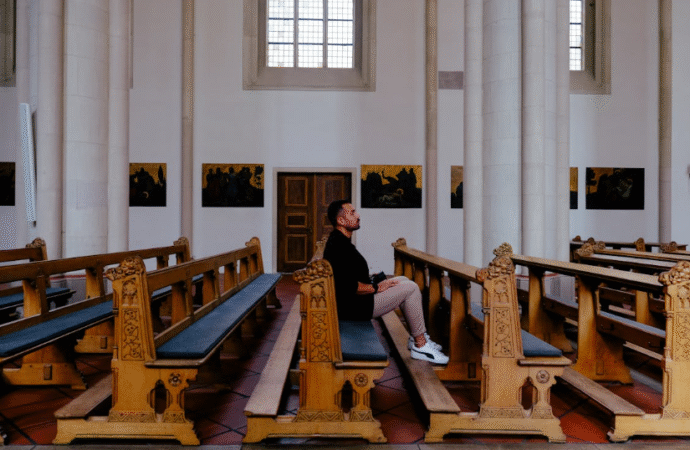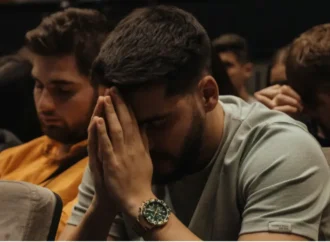In the weeks since Charlie Kirk’s death, many have been appalled at the treatment his life received at the hands of public figures and private individuals – many of whom are the teachers, doctors, and other average people who populate our lives. How can such people, we wonder, treat an apparently innocent man in such a callous, hate-filled way, even if they did disagree with him?
The surface answer to that question is that we no longer have a common culture. And we no longer have a common culture because we have forsaken God.
“The core of common culture is religion,” philosopher Roger Scruton writes in his book, “An Intelligent Person’s Guide to Modern Culture.”
“It goes without saying that a common culture binds a society together,” he went on to say. “But it does so in a special way. The unity of a great society can be achieved by terror, by confronting people with a common danger or an ‘enemy within’ – by variously playing with the threat of death, in the manner of modern dictators.”
Such was the tactic used by the powers-that-be during Covid. In the early weeks of the lockdowns, people were unified, terrified by the idea of this mysterious disease that was permeating the world, ready to do whatever was asked of them – even to the point of shutting down society – in order to combat the great enemy. But such a fearful approach to unification was short-lived. In the end, this initially unifying enemy divided us more than ever.
Instead of unifying society through a common danger, Scruton believes a better approach is to pursue a common culture. “A common culture is an altogether more peaceful method, which unites the present members by dedicating them to the past and future of the community.” Scruton writes.
How do we do this? Caring for the elements of our past and future – namely, the dead and the unborn – are a good place to start, Scruton explains.
“[B]y respecting the dead and their wishes we keep intact the accumulated resources of society,” Scruton writes.
When a school or foundation is dedicated to the dead, then knowledge and property are rescued from current emergencies, and laid by for future generations. The concept of sacrilege [the idea that it’s wrong to violate or misuse that which is sacred] is therefore a safeguarding and conserving force. Without it all resources are open to pillage….
His description is apt for our time. The vitriolic response to Kirk’s death shows that we no longer have any idea of how to appropriately treat the dead, agree with them or not. But we didn’t need Kirk’s death to show us this element in our culture. Consider the rampage against historical statues which took place several years back, or the witch hunt to expunge any aspect of our nation’s history no longer deemed politically correct. Such moves indicated that we no longer had respect for those who had gone before – neither their knowledge nor their physical contributions which smoothed the way for us, their descendants.
When we take this sacrilegious approach to those who have gone before us, we squander our social capital, Scruton writes. In other words, we escalate the tension and vitriol that divides so many of us today.
But it doesn’t stop there. “From the sacrilegious treatment of the dead all other impieties stem,” Scruton writes, “and in impious times (such as ours) the disrespect towards ancestors becomes a recurring motif of public life.”
Thus it seems we come full circle. Religion creates a common culture. Common culture binds society together by showing respect for the dead and the unborn. Those who fail to do this squander their social capital, causing other impieties which cause a society to crumble into disarray and disrespect. And thus we come back to a desperate need to right those impieties through religion once again.
Why is it, as Scruton says, that religion is at the core of a stable society?
The answer to that question, I believe, is that religion – particularly Christianity – is what puts us in right relationship with God. And when we’re in right relationship with God, everything else falls into place, namely, our relationships with family, work, community, and government.
Since Kirk’s death, many have spoken about his relationship with Jesus Christ and his desire to follow Him, causing many others to seek to realign their lives with God and His Word as well. Time will tell if those individuals sincerely mean it and stick with their commitments, but if they do, then we could be on our way to restoring a common culture that respects the past and seeks the best for the future.
—
The republication of this article is made possible by The Fred & Rheta Skelton Center for Cultural Renewal.
Image Credit: Pexels
29 comments















29 Comments
Monserrat Kassulke
September 25, 2025, 4:20 pmIn only 5 weeks, I worked parttime from my condo and acquired $30,030. In the wake of losing my past business, I immediately became depleted. Luckily, I found Sthis occupations on the web, and thus, I had the option to begin bringing in cash from home immediately. Anybody can achieve this tip top vocation and increment their web pay by:.
REPLYSubsequent to perusing this article> https://www.jobs99.site
Michelle G. Sanchez@Monserrat Kassulke
September 25, 2025, 6:53 pmI earn $100 per hour while taking risks and travelling to remote parts of the world. I worked remotely last week while in Rome, Monte Carlo, and eventually Paris. I’m back in the USA this week. I only perform simple activities from this one excellent website.
view it, copy it here….>>>> https://Www.Worksprofit1.online
REPLYWork At Home@Michelle G. Sanchez
September 25, 2025, 8:46 pmBegin working at home with Google! It’s by a wide margin the best occupation I’ve had. Last Wednesday I got a fresh out of the box new BMW since getting a check for $13474 this – a month past. I started this 8-months prior and promptly was bringing home at any rate $every hour. I work through this connection,
go to tech tab for work detail…… https://www.Paycash1.site
REPLYPeterCKemp@Michelle G. Sanchez
September 28, 2025, 5:16 amI get paid more than $120 to $130 per hour for working online. I heard about this job 3 months ago and after joining this i have earned easily $15k from this without having online working skills. This is what I do…….Www.Works6.Com
REPLYAngel@Michelle G. Sanchez
September 28, 2025, 5:27 amI get paid over 220 Dollars per hour working from home with 2 kids at home. i never thought i’d be able to do it but my best friend earns over 15k a month doing this and she convinced me to try. it was all true and has totally changed my life. This is what I do, check it out by Visiting Following Website…
REPLY.
.
HERE—————⊃⫸ https://Www.Cash43.Com
Helga Beckett@Monserrat Kassulke
September 26, 2025, 5:40 amHome-based job that pays more than $2700-$4700+Dollar per week by doing simple tasks on a laptop or mobile device part-time. Last month, I earned $8400 Dollar from this job by working 4 hours per day online. Very simple jobs to do, and the earnings are insane. Everyone can now make more money online by joining the website listed below…..
Here is I started_______ https://Www.EarnApp1.Com
REPLYPeterCKemp@Monserrat Kassulke
September 28, 2025, 5:18 amI get paid more than $120 to $130 per hour for working online. I heard about this job 3 months ago and after joining this i have earned easily $15k from this without having online working skills. This is what I do…….Www.Works6.Com
REPLYRSLewis@Monserrat Kassulke
September 28, 2025, 5:28 amGoogle is now paying $300 to $500 per hour for doing work online work from home. Last paycheck of me said that $20537 from this easy and simple job. Its amazing and earns are awesome. No boss, full time freedom and earnings are in front of you. This job is just awesome. Every person can makes income online with google easily….
REPLY.
More Details For Us→→ http://Www.Payathome9.Com
Sophia Ramos
September 26, 2025, 5:45 amI make over 13k a month working part-time. I listened to different humans telling me how a good deal of cash they may make online,N255 so I was determined to locate out. Well, it turned into all actual and it absolutely modified my life. Everybody must try this job now by just using this site.https://Www.Homeprofit1.site
REPLYSophia Ramos
September 26, 2025, 5:46 amI make over 13k a month working part-time. I listened to different humans telling me how a good deal of cash they may make online,N255 so I was determined to locate out. Well, it turned into all actual and it absolutely modified my life. Everybody must try this job now by just using this site.https://Www.Homeprofit1.site
REPLYzamoralisette
September 26, 2025, 10:04 amFew months ago i got a little problem with my lover which make me and her to break up and i am very happy for Dr Okosun to give me a chance for me to smile again right now i am very happy to get my lover back with Dr Okosun love spell;email him via :or [email protected] or WhatsApp him on +2348054338132
REPLYRiver Rock Casino@zamoralisette
September 26, 2025, 2:02 pmI always thought table games were just about luck until I sat down to play blackjack and roulette online at River Rock Casino and realized there's real strategy and timing involved; deciding when to hit or stand, watching the patterns at the roulette wheel, calculating odds — it all adds up to wins that feel earned and memorable. As a Canadian casino, it feels smooth, trustworthy, and the game variety is excellent, with multiple versions of blackjack plus side bets, different roulette styles, and interactive dealer tables that make every session exciting.
REPLYMadelyn65485
September 26, 2025, 2:36 pmMy friend wanted a simple side income.She gave 2–3 hours online every day Her last month total was $15,900! service.richjob2.com
REPLY